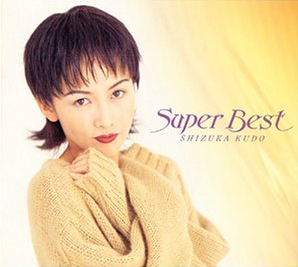
Super Best is the sixth compilation album by Japanese singer Shizuka Kudo. It was released on November 19, 1993, through Pony Canyon. It is Kudo's first single collection, featuring all A-sides produced by Tsugutoshi Gotō and released by Kudo since her solo debut, from "Kindan no Telepathy" up to the most recent at the time, "Anata Shika Inai Desho", spread out on two discs. The compilation also includes one new song, entitled "Honō no Naka e", which was written specifically for the album and which marks the last collaboration with Gotō until 2015, when he composed "Tan Jun Ai vs Hontō no Ai" for the compilation My Treasure Best: Miyuki Nakajima × Tsugutoshi Gotō Collection. Super Best was re-released in APO-CD format on December 1, 1993.

"Kōsa ni Fukarete" is a song recorded by Japanese singer Shizuka Kudo, released as a single through Pony Canyon on September 6, 1989. It is Kudo's last single to be released in 7-inch vinyl format. The song, which has never appeared on an original album, was included in the compilation album, Harvest. It was featured on commercials for Taiyo Yuden That's cassette tapes.

"Again" is a song recorded by Japanese singer Shizuka Kudo for her debut solo studio album, Mysterious. Pony Canyon released the track as the second single from Mysterious on December 2, 1987, in both 12-inch vinyl and maxi single format.
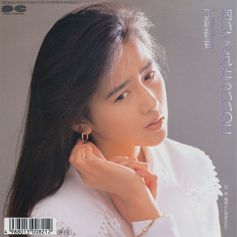
"Daite Kuretara Ii no ni" is a song recorded by Japanese singer Shizuka Kudo. The song was released as a single by Pony Canyon on March 2, 1988. Despite being included in several subsequent compilation albums, "Daite Kuretara Ii no ni" was never included in any studio album. An English version of the song was recorded for Kudo's 1998 ballad compilation album Best of Ballade: Current, on which it is dubbed "Let Me Sleep In Your Arms".
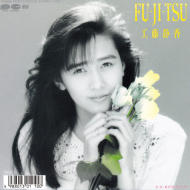
"Fu-ji-tsu" is a song recorded by Japanese singer Shizuka Kudo for her eponymous second studio album, Shizuka. It was released on June 1, 1988 through Pony Canyon as the album's leading single. The song was written by Miyuki Nakajima and composed and produced by Tsugutoshi Gotō. This collaboration with a respected singer-songwriter like Nakajima, as well as Kudo's overall shift in image, were seen as a catalyst for the end of the 1980s idol phenomenon, with Kudo's career path being regarded as the blueprint for the successful transition from idol to artist.
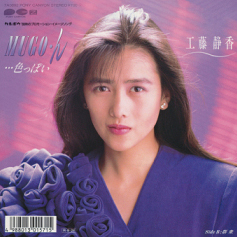
"Mugon... Iroppoi" is a song recorded by Japanese singer Shizuka Kudo. It was released as a single by Pony Canyon on August 24, 1988. It was used in the Kanebo Cosmetics televised ad campaign of fall 1988, for which the catchphrase was "n... Iroppoi". Kudo made her first appearance on the 39th Kōhaku Uta Gassen and performed "Mugon... Iroppoi" for the Red team. The song was nominated for the Grand Prix at the 30th Japan Record Awards.
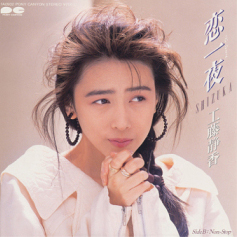
"Koi Hitoyo" is a song recorded by Japanese singer Shizuka Kudo, released on December 28, 1988, by Pony Canyon as the lead single from her third studio album Joy (1989). Almost a year later to the day, Kudo marked her second appearance on Kōhaku Uta Gassen by performing "Koi Hitoyo".

"Arashi no Sugao" is a song recorded by Japanese singer Shizuka Kudo, released as a single by Pony Canyon on May 3, 1989. Although the song is one of Kudo's most recognizable hits, as well as widely considered to be her breakout hit, and despite the fact that it was included on the compilation album Harvest, released later that same year, it was never featured on any of Kudo's studio albums. At the fourth Japan Gold Disc Awards, "Arashi no Sugao" was one of the five recipients of the award for Best Single of the Year. In 2015, DAM asked their users to select their favorite Shizuka Kudo songs to sing karaoke to and compiled a top ten list; "Arashi no Sugao" was ranked number seven.

"Kuchibiru Kara Biyaku" is a song recorded by Japanese singer Shizuka Kudo for her fifth studio album, Rosette. It was released by Pony Canyon as the album's lead single on January 10, 1990. Although it was not officially released on vinyl, a few copies were produced for promotional use. Kudo performed the song on the 41st Kōhaku Uta Gassen, marking her third appearance on the program. In 2015, DAM asked their users to select their favorite Shizuka Kudo songs to sing karaoke to and compiled a top ten list; "Kuchibiru Kara Biyaku" came in at number six.
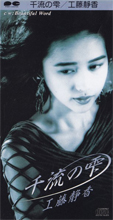
"Senryū no Shizuku" is a song recorded by Japanese singer Shizuka Kudo. It was released as a single through Pony Canyon on May 9, 1990. It marks the debut of Kudo as a songwriter. The song was featured on commercials for Taiyo Yuden That's cassette tapes. Similarly to her previous single, "Kuchibiru Kara Biyaku", a limited number of 7-inch vinyls of the single were produced for promotional use. "Senryū no Shizuku" has never appeared on an original album, but was included in the compilation album Unlimited (1990).

"Watashi ni Tsuite" is a song recorded by Japanese singer Shizuka Kudo. It was released as a single by Pony Canyon on September 21, 1990. The song made its first album appearance on the compilation album Unlimited, released that same year.

"Please" is a song recorded by Japanese singer Shizuka Kudo. It was originally intended to be included on Kudo's sixth studio album, Mind Universe, but was dropped at the last minute. The song was released as a single by Pony Canyon shortly thereafter on May 15, 1991. It made its first album appearance on the compilation album Intimate.
"Metamorphose" is a song recorded by Japanese singer Shizuka Kudo. It is the theme song for the CX television series Nandara Mandara, which starred Kudo herself. It was released as a single through Pony Canyon on October 23, 1991. "Metamorphose" made its first album appearance on the compilation album, Intimate. Kudo performed the song on her fourth appearance on Kōhaku Uta Gassen. In 2015, DAM asked their users to select their favorite Shizuka Kudo songs to sing karaoke to and compiled a top ten list; "Metamorphose" was one of the top vote-getters, rounding up the list at number ten.

"Mechakucha ni Naite Shimaitai" is a song recorded by Japanese singer Shizuka Kudo, from her seventh studio album, Trinity. It was released through Pony Canyon as the album's lead single on January 29, 1992. Kudo performed the song on the 43rd Kōhaku Uta Gassen, marking her fifth consecutive appearance on the annual show. In 2007, Kudo recorded a self-cover of the song with a jazz arrangement for the compilation album Shizuka Kudo 20th Anniversary the Best, released in commemoration of her 20th anniversary.

"Urahara" is a song recorded by Japanese singer Shizuka Kudo. It was released as a single by Pony Canyon on May 21, 1992. The song made its first album appearance on the compilation album, Super Best.

"Koe o Kikasete" is a song recorded by Japanese singer Shizuka Kudo. It was released as a single through Pony Canyon on August 21, 1992. The song was featured on the AX television series Kyōshi Natsuyasumi Monogatari. It made its first album appearance on the compilation album, Best of Ballade: Empathy, released later that same year.
"Dōkoku" is a song recorded by Japanese singer Shizuka Kudo for her eighth studio album, Rise Me. It was released by Pony Canyon as the album's lead single on February 3, 1993. "Dōkoku" is the theme song of the CX getsuku television series Ano Hi ni Kaeritai, starring Momoko Kikuchi and Kudo herself as two sisters who fall in love with the same man. Kudo performed the song on the 44th Kōhaku Uta Gassen, marking her sixth consecutive appearance on the annual show. With over a million copies sold, "Dōkoku" remains Kudo's best-selling single to date. In 2015, DAM asked their users to select their favorite Shizuka Kudo songs to sing karaoke to and compiled a top ten list; "Dōkoku" came in at number two.

"Watashi wa Knife" is a song recorded by Japanese singer Shizuka Kudo. It was released as a single through Pony Canyon on June 2, 1993. It made its first album appearance on the compilation album, Super Best, released later that same year.

"A.S.A.P." is a song recorded by Japanese comedian Takaaki Ishibashi and Japanese singer Shizuka Kudo, under the unit name, Little Kiss, as part of an act for the AX variety show Tunnels no Nama de Daradara Ikasete!!, co-headed by Ishibashi. It was released as a single through Pony Canyon on Valentine's Day 1997. The song was featured on TV commercials for Ginza Jewelry Maki's exclusive jewelry brand Rhapsoamo.

Gradation is the first compilation album by Japanese singer Shizuka Kudo. It was released on November 30, 1988, through Pony Canyon. The album includes all five singles released by Kudo at the time, from "Kindan no Telepathy" through "Mugon... Iroppoi", their coupling songs, as well as one new song, entitled "X'mas ga Ippai", recorded specifically for the compilation. Gradation was re-released in gold CD format on March 21, 1989.



















